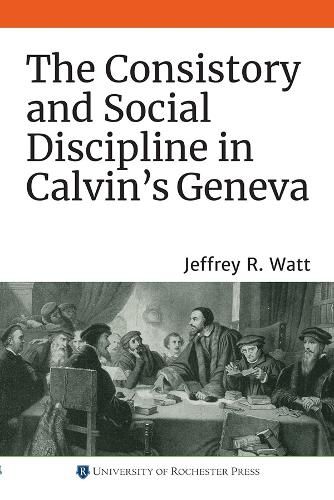Readings Newsletter
Become a Readings Member to make your shopping experience even easier.
Sign in or sign up for free!
You’re not far away from qualifying for FREE standard shipping within Australia
You’ve qualified for FREE standard shipping within Australia
The cart is loading…






Created by John Calvin, the Consistory of Geneva was a quasi-tribunal entrusted with enforcing Reformed morality. Comprised of pastors and elders, this body met weekly and summoned people for a wide range of sinful behavior, such as drunkenness, dancing, blasphemy, or simply quarrels, and was a far more intrusive institution than the Catholic Inquisition. Among the thousands summoned during Calvin’s ministry were a pair of women who were allegedly prophets, boys who skipped catechism to practice martial arts, and a good number of people begging for forgiveness for having renounced Protestantism out of fear of death.
This superbly researched book, reflecting author Jeffrey Watt’s career-long involvement in the ongoing project of transcribing, editing, and publishing the Consistory records, is the first comprehensive examination of this morals court and provides a window into the reception of the Reformation in the so-called Protestant Rome. Watt examines the role of the Consistory in upholding patriarchy, showing that while Genevan authorities did not have a double standard in prosecuting illicit sexuality, the Consistory exhorted women to obey even violently abusive husbands. He finds also that Calvin and his colleagues vigorously promoted a strong work ethic by censuring people, mostly men, for laziness, and showed a surprising degree of skepticism toward accusations of witchcraft. Finally, Watt demonstrates convincingly that, while the Consistory encountered some resistance, Genevans by and large shared the ideals it promoted and that it enjoyed considerable success in fostering discipline in Genevan society.
This book is openly available in digital formats thanks to a generous grant from the Andrew W. Mellon Foundation. It may be found here and elsewhere: https://library.oapen.org/handle/20.500.12657/42650.
$9.00 standard shipping within Australia
FREE standard shipping within Australia for orders over $100.00
Express & International shipping calculated at checkout
Created by John Calvin, the Consistory of Geneva was a quasi-tribunal entrusted with enforcing Reformed morality. Comprised of pastors and elders, this body met weekly and summoned people for a wide range of sinful behavior, such as drunkenness, dancing, blasphemy, or simply quarrels, and was a far more intrusive institution than the Catholic Inquisition. Among the thousands summoned during Calvin’s ministry were a pair of women who were allegedly prophets, boys who skipped catechism to practice martial arts, and a good number of people begging for forgiveness for having renounced Protestantism out of fear of death.
This superbly researched book, reflecting author Jeffrey Watt’s career-long involvement in the ongoing project of transcribing, editing, and publishing the Consistory records, is the first comprehensive examination of this morals court and provides a window into the reception of the Reformation in the so-called Protestant Rome. Watt examines the role of the Consistory in upholding patriarchy, showing that while Genevan authorities did not have a double standard in prosecuting illicit sexuality, the Consistory exhorted women to obey even violently abusive husbands. He finds also that Calvin and his colleagues vigorously promoted a strong work ethic by censuring people, mostly men, for laziness, and showed a surprising degree of skepticism toward accusations of witchcraft. Finally, Watt demonstrates convincingly that, while the Consistory encountered some resistance, Genevans by and large shared the ideals it promoted and that it enjoyed considerable success in fostering discipline in Genevan society.
This book is openly available in digital formats thanks to a generous grant from the Andrew W. Mellon Foundation. It may be found here and elsewhere: https://library.oapen.org/handle/20.500.12657/42650.